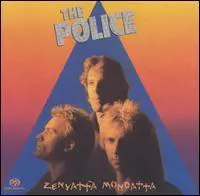For their their third album, the Police reclaimed some of the speed from Outlandos d'Amour and applied the polish from Reggatta de Blanc to create a long-player perfect for pop radio that could still reference its punk roots. Though the thick sheen of the production does sap some of the album's soul, the Police play with enough conviction on Zenyatta Mondatta to make a record that heavily draws from their earlier efforts while taking a few steps forward.
The opening track, "Don't Stand So Close to Me" sums up the attitude of the entire album and even, to an extent, the Police's career. The song is about a teacher being helplessly attracted to his underage student and makes a reference to Lolita. The tune flaunts a pop song refrain that covers a creepier meaning and surrounds itself with a little bit of pretension. But, Sting's pretension is just a little evident here and the pop hook is a real thumb-snapper so we're exposed to the perfect Police balancing act: good jams played with conviction and purpose. But, unlike their punk contemporaries, the Police's purpose wasn't to make politically thoughtful music. Their mission was to strive towards the so called "perfect song." Although they never reach it (and aside from the Ramones and few others no one else does, either), they came just about as close as they ever did.
At points, the album does become a little bubble gum-ish with both its lyrics and sounds. While the point of "De Do Do Do, De Da Da Da" might be to make light of non-sensical lyrics in most love songs, the fact remains that the song could have sat right at home on a Bow Wow Wow album. But, nevertheless, the tune justifies itself on the merits of its hooks, which either makes the listener boogie down in his or her car and look like a complete dork or send the album for a trip to the second-hand shop.
Conversely, this album featured some of the Police's darkest and most daring compositions. "Driven to Tears" finds the Police tinkering with their solemn reggae pattern. While the song plays almost like a dirge, Sting's muted squeal creeps from between the thick bass just enough tug along the tune creating an understated and under-appreciated portrait misery. On the flip side we find "Behind My Camel," doubtlessly the group's most sinister tune. As the trio begins to tinker with synthesizes, the song feels like the soundtrack to a sci-fi horror and keeps those computer generated sounds to such a minimum that not only are they tolerable, but they're enjoyable.
After this album, the band would fall deeper and deeper into the `80s synthesizer trap and before long they wound up with singles on adult contemporary charts. But, Zenyata Mondatta, the last Police album to have a truly organic feel, seems to come out just as the Police intended. It's not a shallow album, but it's not that deep either. It's fast, but not blinding. The band plays with fire, but has the rough edges trimmed out by smooth production. What is usually a recipe for mediocrity winds up being just the thing to highlight the true songwriting skills of Mr. Sumner, Mr. Copeland, and Mr. Summers. The boys break through polished production to deliver a unique product delivered with a purpose. Yes, it's a product, but it's just the product the band wanted to create.
